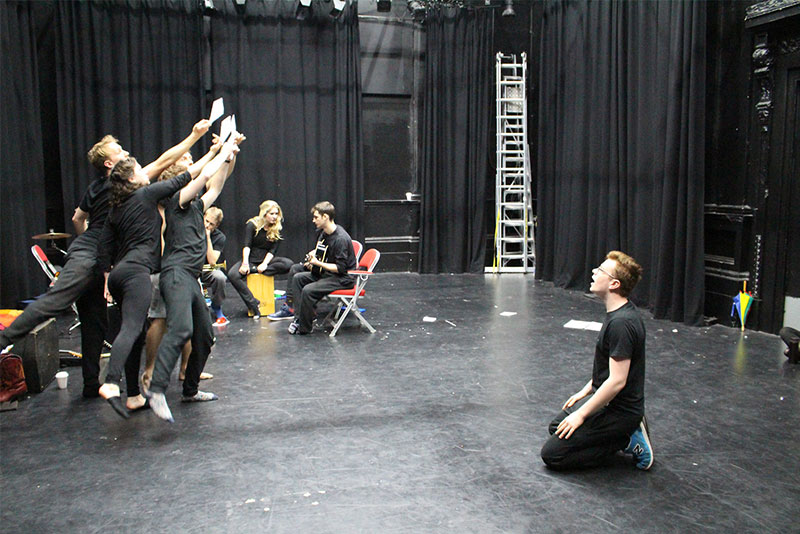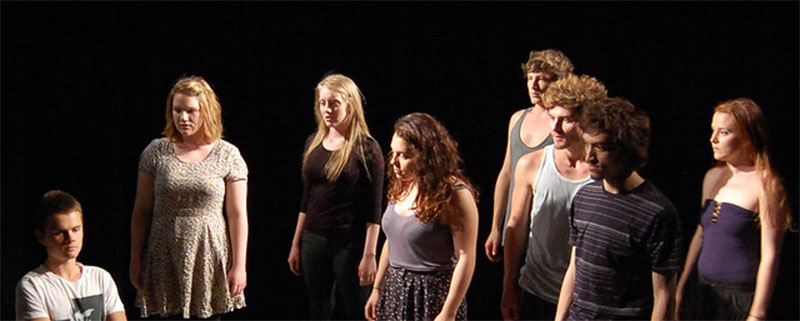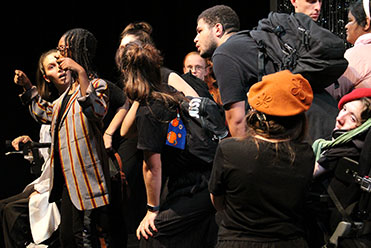
Theatre is a tenacious thing, though we are constantly reminded it is an art form for which the bell reportedly tolled long ago. Cynics claim our culture outgrew theatre long ago and declare, “We have Netflix, what purpose can theatre possibly still serve?” when a better question is “What is the value of theatre?” The answer to that question is befuddling to some and deeply satisfying to others. Theatre, at its core, is about the struggle to comprehend the human condition. More particularly, as Seattle critic Brendan Kiley notes, theatre is about attaining emotional solidarity. Theatre is about community. This precisely is what instructor Sophe Friedman seeks to realize through her class, Using Devised Theatre as a Catalyst for Social Change.
Friedman was first introduced to acting and dance by her family at a young age. “My parents are advocates of the arts and put me in every production they could when I was young,” she recalls. “My grandparents live in New York City, so whenever I visited they would always take me to a show. My grandmother would enroll me in any children’s theatre camps she could find because she saw I loved theatre just as she did. It has always felt like theatre has been a part of my life because it was a safe place for me to always run back to.”
It should come as no surprise to learn that later in life Friedman made theatre the primary focus of her education. “The performing arts have always been a place for me to express myself, to connect, to learn, to educate and to create,” she says. “The arts have been the most educational and transformative aspect in my life. I danced from the age of four through eighteen and I have been involved with theatre from four to the present. I decided that I wanted to make theatre my life and attended Chapman University in Orange, California for my undergraduate degree where I received a Bachelor of Arts in Theatre Education.”
It was while attending Chapman that Friedman discovered her passion for directing and teaching. “I have always loved that theatre sheds light on other people’s stories and provides a place for the audience to connect and learn about so many different worlds. Because of my love for educating I naturally found my way into education,” she says. “I joined the Teach for America 2016 corps in Los Angeles where I received my Masters of Arts in Urban Education and Literacy and am now going into my fourth year of teaching in public schools. I have been fortunate enough to teach theatre classes as well as direct productions with elementary, middle and high schoolers.”
During this time Friedman discovered devised theatre and the impact on her was profound. “Devised theatre is a collaborative creation where the participants are the actors, the playwrights, the directors, the producers and the designers,” she says. “Together the participants create a performance piece that did not exist before the production process began. Through collaboration the participants create the script, which can include any type of art form the participants deem fit. Devised Theatre is as old as the theatre itself since it employs improvisation, clowning, commedia dell’arte, pantomiming and other types of performing arts in order to create the performance.” Friedman notes devised theatre styles differ depending on the type of performance the participants want to create.
While in school, Friedman partook in two devised theatre projects and quickly learned there would be no looking back. “Both projects aimed to share the vulnerability of the human experience with the audience,” she says. “Being part of these projects were incredibly fulfilling because of the opportunity to take part in the creation of the piece as well as performing in it. I was able to have my voice heard by bringing stories and personal experiences to which I connected and help create something that was bigger than myself; the production. It truly is so magical to be part of a devised theatre project.”
Friedman took her newfound passion for devised theatre and shaped it into her master’s thesis. “I chose to explore how students could be agents of change through theatre,” she says. “I led my 9-12th grade students through the devising process to help them create, direct and produce five short plays about the negative effects of violence and gang culture on their lives. Students performed their devised work for the school community. As a result, we provided students a place to share their personal experiences with others.”
The process of facilitating a devised theatrical piece was not only fulfilling but life-changing for Friedman. She felt she found her niche in theatre and meant to bring as many to the table as possible. “Students had a place where they could share their own personal experiences and connect to each other. It was a safe space and a place for them to be as creative as they wanted to be,” she says. “I watched them blossom and take ownership of the process. It was clear the process was transformative for them as they now had the agency to shed light on the issues of violence and gang culture—a prevalent issue in their community—and begin the conversation in a school setting reflecting on the lives students lead in that community.”
“Theatre in and of itself is a catalyst for social change,” says Friedman. “The power of theatre is to tell stories and connect to the human experience. There are so many successful productions that have sparked change that are both devised or otherwise, even in mainstream theatre. In creating Hamilton, Lin Manuel Miranda created a new type of musical theatre incorporating hip hop into musicals. This is transformative because it taught the audience about American history while making the audience question who will tell their story. The cast is entirely comprised of people of color providing role models in the arts for youth of color.”
Historically, the use of devised theatre as a catalyst for social change is as old as civilization, but an actual established process dates back to Augusto Boal’s groundbreaking work,Theatre of the Oppressed. “Boal founded his group when a coup turned Brazil into a military dictatorship in 1964. It became necessary for Brazilians to be heard,” says Friedman. “Boal’s form of combating oppression and giving a voice to the disenfranchised was through dramatic expression in a public setting”
Utilizing non-actors like factory workers and shopkeepers, Boal tapped the oppressed classes to advocate for themselves through theatrical expression. “Boal believed that acting is for everyone regardless of age or experience,” says Friedman. “There are numerous examples of how theatre has been a successful catalyst for social change because theatre reflects life.”
Today, devised theatre is being used all over the world as a form of problem-solving and educating others on social issues in an effort to effect change. “Lynn Dalrymple is a modern activist and artist who utilizes  performance and drama exercises with citizens in Zululand, Africa to educate young people about HIV and AIDS,” says Friedman. “Dalrymple used theatre as an intervention technique to disease, how they can avoid infection, and mediate further conversation.”
performance and drama exercises with citizens in Zululand, Africa to educate young people about HIV and AIDS,” says Friedman. “Dalrymple used theatre as an intervention technique to disease, how they can avoid infection, and mediate further conversation.”
Students joining Using Devised Theatre as a Catalyst for Social Change will be called upon to build an ensemble by first immersing themselves in a variety of improvisation activities, writing, interviews with family and friends, research articles, poems, and other works that all fall under the umbrella of the group’s established theme. “We will compile all the material and decide together on the story we want to tell,” says Friedman. “I am the facilitator but the participants have ownership over what they want to share with the audience, the story they want to tell and the roles they will play.”
“I hope to achieve a final product that every participant is extremely proud of and feels will shed light onto the issue discussed,” says Friedman. “I hope that the audience leaves more knowledgeable about the issue explored and is inspired to take action around the issue. I hope that the final piece connects each participant and each audience member to the theme and that awareness, if nothing else, of said issue is brought to light.”
Friedman feels that in many ways the journey devised theatre participants take is just as important as the outcome. “I hope that students take pride in what they create and offer something powerful to their community,” she says. “I want students to see that there are numerous creative ways to share their own experiences and bring awareness around issues. My goal is for students to feel a sense of connection and community with one another. I hope students leave inspired and know concrete ways they can bring further awareness around topics they are passionate about to create change. And I definitely hope that regardless of where students were when they entered my class that they leave actors, directors, producers, writers, designers, and change makers.”
Learn more about Using Devised Theater as a Catalyst for Social Change.
Photo credits:
Half Moon Young People's Theatre
Youth Theatre
Half Moon Young People's Theatre